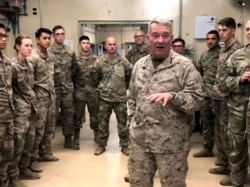The withdrawal of U.S. and coalition forces from Afghanistan could lead to the eventual collapse of the country's own security forces, according to the commander of U.S. forces in the Middle East and South Asia.
U.S. Central Command's Gen. Kenneth "Frank" McKenzie told lawmakers Thursday that the presence of some 10,000 American and coalition troops has allowed Afghan security forces to maintain a stalemate with the Taliban, but that things could change rapidly once Afghan forces are on their own.
"My concern is the ability of the Afghan military to hold the ground that they're on now without the support they've been used to for many years," McKenzie told members of the Senate Armed Services Committee.
"I am concerned about the ability of the Afghan military to hold on after we leave, the ability of the Afghan air force to fly, in particular, after we remove the support for those aircraft," McKenzie said, noting the U.S. and NATO no longer provide direct support to Afghan forces. "It's the enabling things that actually give them an edge over the Taliban."
McKenzie's assessment runs counter to assurances given by other U.S. officials as well as by Afghan President Ashraf Ghani, who expressed confidence in his forces on Twitter.
"Afghanistan's proud security and defense forces are fully capable of defending its people and country, which they have been doing all along," Ghani wrote last week.
But concern about the Afghan security forces, and the future stability of Afghanistan, has been growing since U.S. President Joe Biden announced last week, after months of deliberations, that he would begin pulling U.S. forces from the country starting May 1.
"It's important the American people understand that the repercussions of this are not going to be pretty," said Republican Senator Mike Rounds. "We will see reports of atrocities in those areas as committed by the Taliban if these Afghan national forces are not able to hold their own."
Threat of increased violence
There has also been concern about the safety of U.S. and coalition forces during the withdrawal.
Some lawmakers and analysts see the likelihood of a Taliban attack on withdrawing U.S. forces as high, citing threats from Taliban officials that "problems will certainly be compounded" if U.S. troops do not adhere to the original terms of the deal and vacate Afghanistan by May 1.
U.S. military officials say planning and coordination with the Afghan government and other allies is still under way, but McKenzie said the U.S. and its allies would be ready.
"We will have additional capabilities, and I'm confident that we and our coalition partners will be able to extract ourselves," he told lawmakers Thursday. "We're prepared if the Taliban want to take shots at us."
But McKenzie said the bigger concern is what happens to Afghan security forces once U.S. and NATO forces are gone, admitting that the Taliban have at least 50,000 fighters at their disposal and control more territory now than they did a decade ago.
"If we don't provide them some support, they certainly will collapse, and I think that's not in our best interest," he said.
Those concerns are not new. The U.S. Special Inspector General for Afghanistan Reconstruction (SIGAR), John Sopko, warned in March that without U.S. and international assistance, and in absence of a viable peace agreement, "Taliban forces could be at the gates of Kabul in short order.”
SIGAR further warned that without U.S. and international contractors, all of whom are slated to leave as part of the withdrawal, the Afghan air force could be effectively grounded within months.
An opening for terror groups
A study group mandated by Congress also sounded alarms in February, noting that a U.S. withdrawal would create opportunities for terror groups, including al-Qaida and Islamic State.
"We believe a U.S. withdrawal will provide the terrorists an opportunity to reconstitute," retired General Joseph Dunford, study group co-chair and former chairman of the U.S. Joint Chiefs of Staff, said at the time. "That reconstitution will take place in about 18 to 36 months."
On Thursday, however, U.S. Central Command's McKenzie expressed more immediate fears.
"Protection of an embassy is the responsibility of the host nation," he told lawmakers. "It is a matter of great concern to me, and I think everyone, whether or not the future government of Afghanistan is going to be able to do that after we leave."
Several lawmakers, though, voiced support for the decision to pull U.S. troops from Afghanistan despite the risks.
"We should have learned by now that a conditions-based withdrawal is just a recipe for staying in Afghanistan forever," Democratic Senator Elizabeth Warren said during Thursday's hearing.
"Defense officials have come before this committee year after year to proclaim that the U.S. has 'turned the corner' in Afghanistan," she said. "But all I see is a vicious cycle that damages our nation's reputation abroad and keeps our troops in harm's way while producing little tangible benefit for our security."








